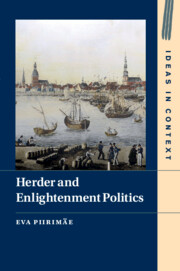Book contents
- Herder and Enlightenment Politics
- Ideas in Context
- Herder and Enlightenment Politics
- Copyright page
- Contents
- Preface
- Acknowledgements
- Note on Translations
- Abbreviations
- Introduction
- Chapter 1 Republics, Monarchies and the Philosophy of Human Society
- Chapter 2 Rousseau and the Origins of the ‘Current Malaise of the World’
- Chapter 3 Montesquieu’s System and Reforms in Russia
- Chapter 4 The Bildung of Humanity and Modern Virtue
- Chapter 5 German Freedom and Modern Liberty
- Chapter 6 The Vocation of Poets, Pastors and Philosophers
- Chapter 7 State-Machines, Commerce and the Progress of Humanität in Europe
- Chapter 8 Perpetual Peace and Purified Patriotism
- Conclusion
- Epilogue
- Bibliography
- Index
Introduction
Published online by Cambridge University Press: 30 March 2023
- Herder and Enlightenment Politics
- Ideas in Context
- Herder and Enlightenment Politics
- Copyright page
- Contents
- Preface
- Acknowledgements
- Note on Translations
- Abbreviations
- Introduction
- Chapter 1 Republics, Monarchies and the Philosophy of Human Society
- Chapter 2 Rousseau and the Origins of the ‘Current Malaise of the World’
- Chapter 3 Montesquieu’s System and Reforms in Russia
- Chapter 4 The Bildung of Humanity and Modern Virtue
- Chapter 5 German Freedom and Modern Liberty
- Chapter 6 The Vocation of Poets, Pastors and Philosophers
- Chapter 7 State-Machines, Commerce and the Progress of Humanität in Europe
- Chapter 8 Perpetual Peace and Purified Patriotism
- Conclusion
- Epilogue
- Bibliography
- Index
Summary
In the last decades, scholars have carved out Herder’s original and interconnected ideas about epistemology, metaphysics, philosophical anthropology, language, and aesthetics, situating his thinking in various strands of Enlightenment philosophy, natural history and hermeneutics. Several recent studies have also dissected Herder’s moral and political ideas. However, Herder’s views on modern European politics and the evolution of his political thought have remained largely unexplored. In particular, his self-avowed ‘German patriotism has not been studied at any depth. At the same time, a debate on Herder’s relationship to nationalism still lingers on. This study proposes that reconstructing Herder’s serial contributions to eighteenth-century discussions on the moral psychological foundations of, and the possible reforms in, modern societies provides a key to understanding the evolution of his political thought, including his relationship to nationalism. In engaging with thinkers such as Rousseau, Montesquieu, Möser, Ferguson, and Kant, Herder addressed questions on how to close the gap between moral principles and action, as well as law and ethics, in contemporary societies.
Keywords
- Type
- Chapter
- Information
- Herder and Enlightenment Politics , pp. 1 - 30Publisher: Cambridge University PressPrint publication year: 2023

